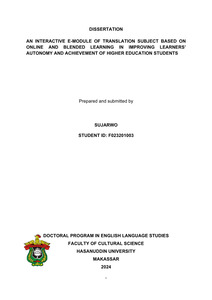SUJARWO, SUJARWO (2024) AN INTERACTIVE E-MODULE OF TRANSLATION SUBJECT BASED ON ONLINE AND BLENDED LEARNING IN IMPROVING LEARNERS’ AUTONOMY AND ACHIEVEMENT OF HIGHER EDUCATION STUDENTS = E-MODUL INTERAKTIF MATAKULIAH PENERJEMAHAN BERBASIS PEMBELAJARAN ONLINE DAN BLENDED UNTUK MENINGKATKAN BELAJAR MANDIRI DAN PRESTASI BELAJAR MAHASISWA. Disertasi thesis, Universitas Hasanuddin.
![[thumbnail of Cover]](/45644/1.hassmallThumbnailVersion/F023201003_disertasi_03-10-2024%20cover1.png)

F023201003_disertasi_03-10-2024 cover1.png
Download (80kB) | Preview
F023201003_disertasi_03-10-2024 1-2.pdf
Download (1MB)
F023201003_disertasi_03-10-2024 dp(FILEminimizer).pdf
Download (918kB)
F023201003_disertasi_03-10-2024(FILEminimizer).pdf
Restricted to Repository staff only until 26 August 2027.
Download (2MB)
Abstract (Abstrak)
SUJARWO. An Interactive E-Module of Translation Subject Based on Online and Blended Learning in Improving Learners’ Autonomy and Achievement of Higher Education Students. (Supervised by Abdul Hakim Yassi, Herawaty Abbas, and Harlinah Sahib). Background. Online and blended learning are increasingly in demand because of their flexibility and ability to deliver material more interactively. Interactive e-modules support this model by providing content that can be accessed anytime and anywhere. Aim: To investigate the effect of interactive E-modules of translation based on online and blended learning in improving learners’ autonomy and learning achievement. Method. This study used a quasi-experimental method. Data analysis used PLS-SEM and SPSS. The population was 135 students, and the sample size was 45 students from the English education study program at Muhammadiyah University of Makassar and Megarezky University. Results. The analysis results used PLS-SEM show that 1) interactive E-modules of translation significantly affect online learning. Adaptive indicates the most effective interactive E-module in improving online learning. 2) interactive E-model had a significant effect on blended learning. Adaptive indicates the most effective interactive E-module in improving blended learning. 3) Blended learning had a significant effect on autonomous learning. Collaborative learning indicates the most effective way to improve students’ autonomy. 4) There was no significant effect of online learning on autonomous learning. Attitude indicates the least effective online learning in improving students’ autonomy through interactive E-Module. 5) Adaptive contributes the most effectively in improving students’ autonomy through blended learning. However, online learning did not provide an effective influence on autonomous learning. 6) The SPSS results significantly affect students' translation learning achievement through blended learning, with a significant value of <0.05. Conclusion. Interactive E-module of translation based on online and blended learning significantly affects the students’ autonomy. Online learning does not affect autonomous learning; blended learning significantly affects students' autonomy and achievement through collaborative, adaptive, self-regulated learning. Furthermore, this study proposes a new model called the Integrated E-Learning Media Acceptance (IELMA) Model.
Keyword : Achievement, Autonomous Learning, Blended Learning, IELMA Model, Interactive E-Module, Online Learning, Translation
| Item Type: | Thesis (Disertasi) |
|---|---|
| Uncontrolled Keywords: | Achievement, Autonomous Learning, Blended Learning, IELMA Model, Interactive E-Module, Online Learning, Translation. |
| Subjects: | P Language and Literature > PR English literature |
| Divisions (Program Studi): | Fakultas Ilmu Budaya > Sastra Inggris |
| Depositing User: | Rasman |
| Date Deposited: | 30 Jun 2025 05:07 |
| Last Modified: | 30 Jun 2025 05:07 |
| URI: | http://repository.unhas.ac.id:443/id/eprint/45644 |


